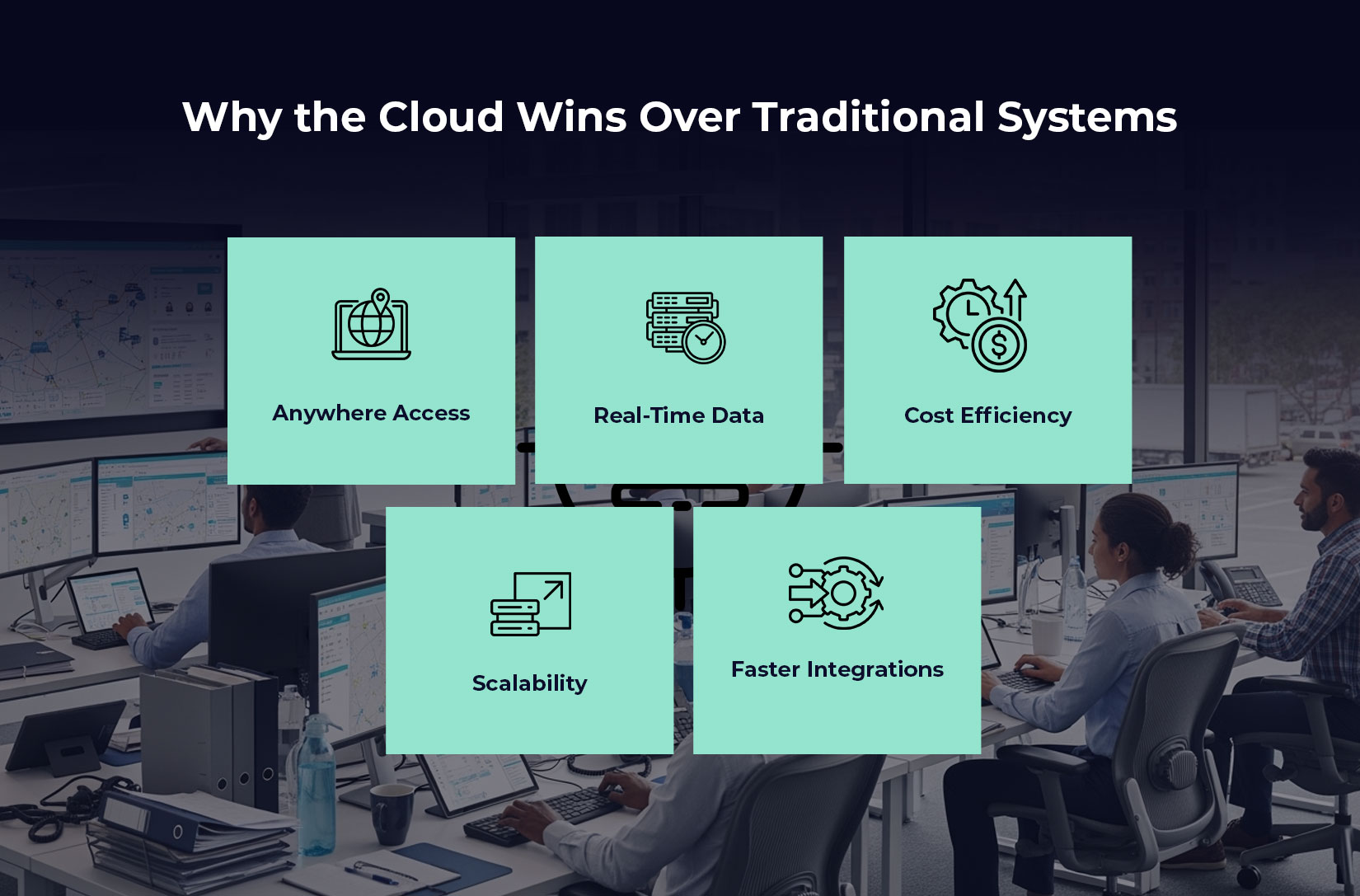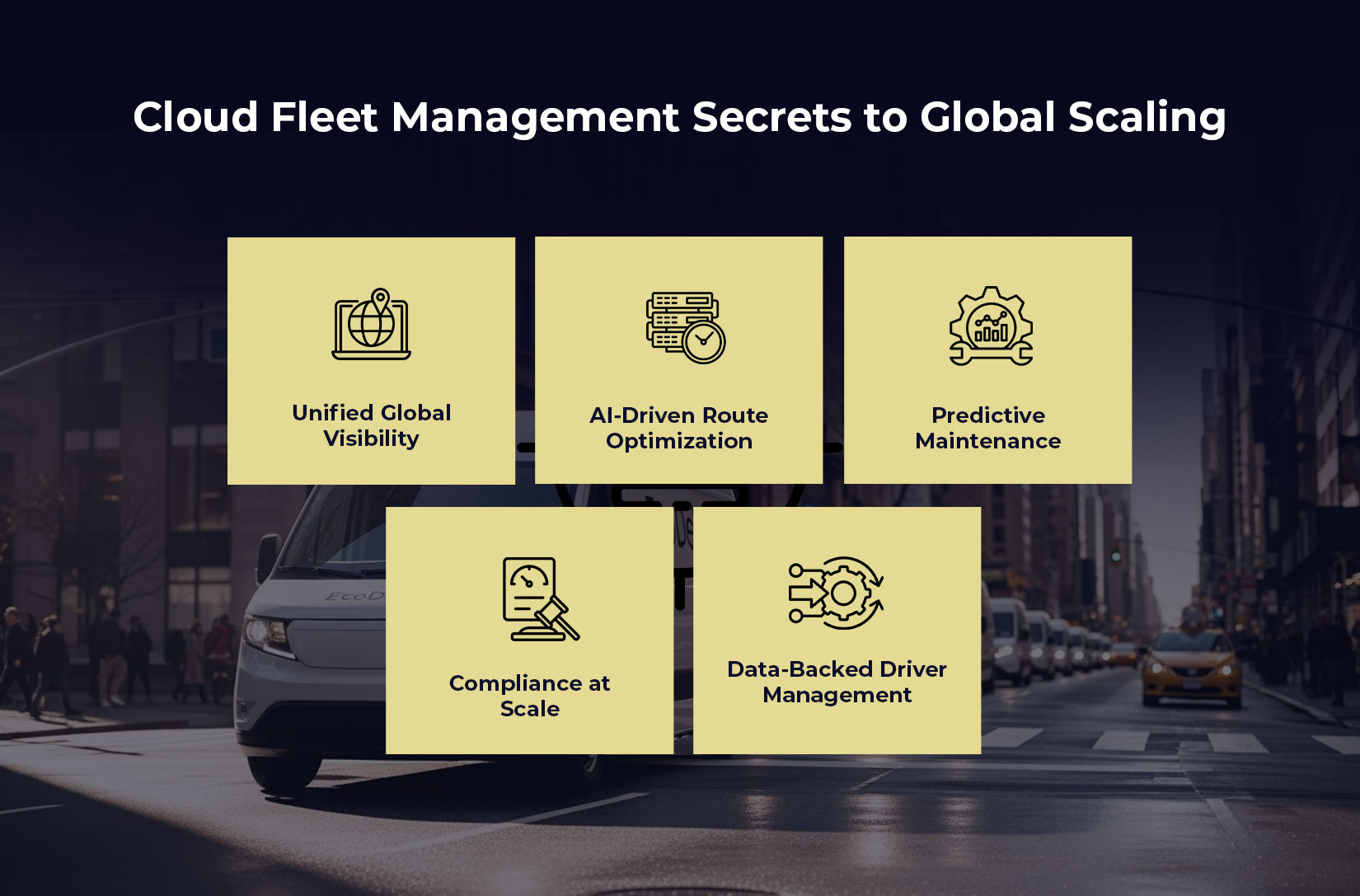
Scale Globally Without Breaking a Sweat: Cloud Fleet Management Secrets
Its no small feet to run a fleet in today’s economy. Scaling operations across regions requires efficiency, visibility and control. Traditional fleet systems often fail against these challenges. That is where a Cloud Fleet Management System steps in. It offers enterprises a smarter, speedy and more scalable way to maneuver their logistics.
In this blog, we will understand and uncover how businesses can scale without breaking a sweat. With the help of cloud fleet management software and its hidden strengths.
The Global Fleet Challenge
Fleet management is no longer a simple scheduling and fuel tracking, it has evolved far beyond that. According to McKinsey, logistics and transportation costs can account up to 12% of the global GDP. That is a huge spend and inefficiencies can eat the margins.
Globally expanding enterprises face some common pain points:
– Cross-border compliance delays.
– Increasing costs of fuel and maintenance.
– Poor real-time visibility.
– Inability to integrate local operations into one efficient system.
These bottlenecks slow growth and frustrate customers. The business owners need a solution that should have the ability to scale as the business does. Which is the cloud fleet management platform.
What Is a Cloud Fleet Management System?
It is a technology-driven platform uses the power of cloud to manage vehicles, drivers and deliveries in real-time. Contrary to legacy systems, that rely on on-premises hardware, cloud solutions run on secure servers which can accessed from anywhere.
Key capabilities include:
– Real-time tracking and monitoring
– Automated route optimization
– Predictive maintenance alerts
– Driver performance analytics
– Compliance and documentation management
It is like a digital backbone for modern fleet operations. Which is built to handle both local and global complexity.
Why the Cloud Wins Over Traditional Systems

By shifting to cloud fleet management software, its not only about moving operations online. Its about unleashing the advantages that directly support scaling to a global level.
1. Anywhere Access:
With just one login, managers can monitor fleets across various countries. Due to this there is no need of juggling between multiple local systems or using office servers. Whether on road or in the office, the decision maker has the complete visibility.
2. Real-Time Data:
Unlike manual spreadsheets or outdated hardware, cloud platforms offer live tracking and instant updates. This helps to ensure faster decisions, fewer errors and a stronger customer experience.
3. Cost Efficiency:
There is no need of expensive servers or IT teams to maintain the infrastructure. Due to this businesses save on capital expenditure and end up paying for only what they use. Thus, making budgets more predictable.
4. Scalability:
To add vehicles, regions or services you don’t need a new IT overhaul. With this the growth of the company becomes seamless.
5. Faster Integrations:
Cloud APIs are easily able to connect with ERPs, CRMs and logistics systems. Thus creating a smooth digital ecosystem.
Gartner reports that 80% of enterprises will move to cloud-based platforms by 2026 to improve agility and reduce costs. Fleet operations are no exception.
Cloud Fleet Management Secrets to Global Scaling

Scaling globally necessitates more than simply migrating to the cloud, it requires the strategic utilization of the technology. Here are the secrets top enterprises are taking advantage of:
1. Unified Global Visibility:
Cloud platforms combine all data into one centralized location, which creates a single source of truth for enterprises. It is much easier to determine performance gaps, monitor compliance across multiple regions, and standardize operations.
2. AI-Driven Route Optimization:
A cloud fleet management platform can process massive amounts of data simultaneously, including traffic, weather, and delivery data. AI builds optimum routes utilizing this data that saves fuel. Studies have shown it can reduce delivery time by as much as 20 percent.
3. Predictive Maintenance:
Fleet downtime is expensive. Cloud fleet management technology is able to utilize Internet-of-Things (IoT) sensors alongside predictive analytics to reveal maintenance needs in advance. This way, enterprises can proactively ensure equipment does not break down and can save money on repairs.
4. Compliance at Scale:
Managing a multi-national fleet means managing multiple regulations. Cloud systems automate compliance reporting to ensure vehicles are compliant with safety and emission requirements across borders.
5. Data-Backed Driver Management:
Retention has become increasingly important due to record high driver shortages. Cloud systems allow managers to track driver behavior, safety history, and performance numbers to coach drivers and reward efficiency.
Real-World Impact of Cloud Fleet Management
For a glimpse of the true value, consider this: A North American-based multinational logistics provider claimed they reduced their fuel costs by 25 percent and improved on-time deliveries by 30 percent after implementing a cloud-based fleet management solution. The managing supervisors were able to optimize routes, monitor driver behaviors, and turn delays into instantaneous decisions due to the centralized visibility.
Another enterprise that is expanding into Southeast Asia has grown their operations from 200 vehicles to 1,500 vehicles in less than one year without increasing their IT capacity. Their success came from using a cloud-based fleet management software that made expanding globally a seamless, data-centric exercise.
The Future of Cloud Fleet Management
There’s no question that cloud-first is the future of fleet operations. Technological advancements such as generative AI, predictive analytics, and blockchain are revolutionizing fleet operations; allowing for faster and more accurate compliance, route planning, and decisions. Enterprises can manage large, distributed fleets frictionless of legacy systems with a cloud-first approach.
Cloud fleet management technology will only push further in the future with the integration of autonomous vehicles and sensors with IoT technology. Enterprises adopting these innovations will not only meet the growing global demand; they will lead the charge in efficiency and scalability.
Conclusion
Scaling up globally isn’t simply putting more vehicles on the road; it’s all about using the right technology to manage your fleet. A Cloud Fleet Management System provides the insight, management, and intelligence enterprises need to flourish in the modern logistics landscape.
By using cloud-based fleet management software, and in leveraging advanced cloud fleet management technology, businesses can reduce costs, operate more efficiently, and expand into new markets while being comfortable.
The future of global fleet management is in the cloud. The real question is: are you ready to scale? So, click on the red button below and book a demo with LogiNext Solutions.
36







@LogiNext